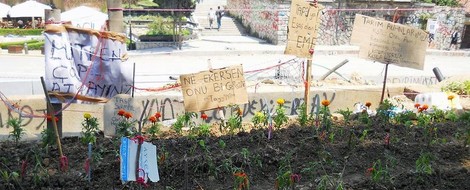Your podcast discovery platform
Curious minds select the most fascinating podcasts from around the world. Discover hand-piqd audio recommendations on your favorite topics.

piqer for: Global finds Technology and society Globalization and politics
Elvia Wilk is a writer and editor living in New York and Berlin, covering art, architecture, urbanism, and technology. She contributes to publications like Frieze, Artforum, e-flux, die Zeit, the Architectural Review, and Metropolis. She's currently a contributing editor at e-flux Journal and Rhizome.
Learning From Gezi Park How To Forge An "Architecture Of The Commons"
The initial aim was to protect the park from the police by continuous occupation, but late in the evening of the first day, one inhabitant was already talking about the kind of vegetables he wanted to plant in the organic garden next summer.
The relationship between public space, social life and political organising was fundamentally renegotiated during the 2013 Gezi Park protests in Istanbul. Merve Bedir, an architect and curator who participated in the protests herself, offers in this essay (for the shiny new Archifutures publishing platform) an on-the-ground, nuanced account of how the movement formed. In addition to this vital historicisation, she provides a series of constructive and thoughtful considerations of how designers and architects can build spaces where similar experiences of the “commons” can flourish.
For the uninitiated, what are these "commons"? Bedir explains:
[The] common(s) is as a new kind of (urban) space that is outside the dichotomy of public and private; a space that is created by collective action, by people; not trying to be permanent but looking for the transforming capacity of the temporary.
Important food for thought: according to Bedir's experiences, the spaces of the kitchen and the garden turn out to be central to any creation of the commons, either permanent or temporary. Such communally owned and self-sufficient spaces, which are dependent on participant activity rather than capital investment, and which allow people's private and political lives to intersect over a meal, are part and parcel of what "commoning" means. And food doesn't just help things along — growing vegetables, it seems, may not be an offshoot but a fundamental part of socio-political organising.
